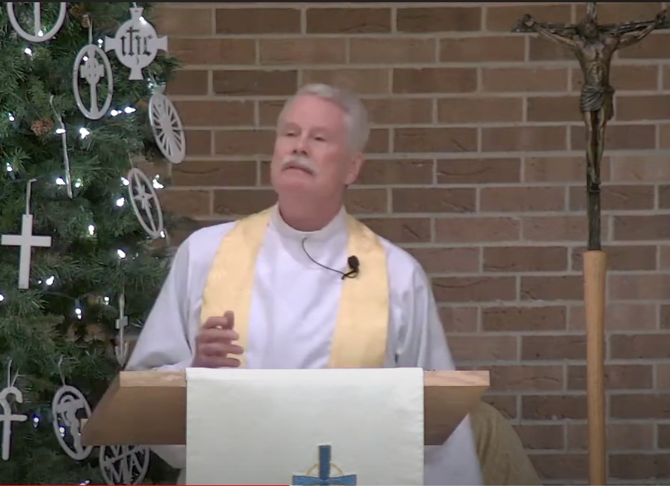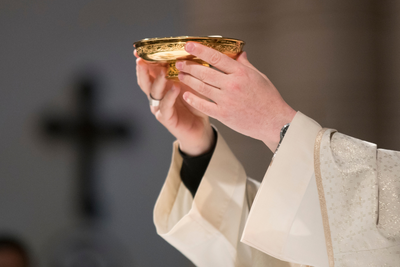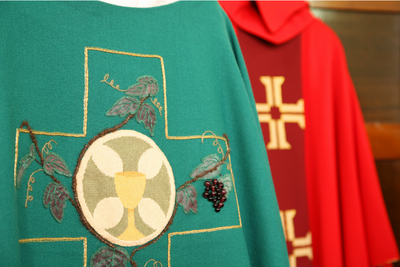Tuesdays
- 8:00 AM Tuesday Crew
Sundays
- 9:00 AM – Divine Service/Holy Communion
- 10:30 AM – Bible Study
- 11:35 AM – Adult Choir
In the Divine Service God gives us His gifts. He speaks to us and is with us, just as Isaiah predicted that He would be Immanuel, “God with us,” when He was born for us at Bethlehem.
The Bible is how God communicates with us - His “Word”. Pastors - God’s shepherds of His people (whom He calls His sheep) - teach you what the Bible says and encourage you in the life Christ gives you. Specially trained to fulfill the office of pastor established by Jesus, God’s ministers preach sermons that unfold the meaning of God’s Word rather than expressing their opinions, wills, or preferences. In the sermon, you will hear God’s truth applied to your life so that you might have hope now and forever in our Lord Jesus Christ.
In the Divine Service, God is with us, and we are with Him. Whenever the family gathers, the Father with His children, everyone has something to give, something in which the other delights. When God gives to us, that is called a “sacramental” act, and when we give something to God, as a child might give his poorly drawn picture to his father, but the father is nonetheless delighted to have that drawing, that is called a “sacrificial” act.
The way to tell the difference between the two in the Service is to look at which way the pastor is facing.

Trinity's worship follows the historic liturgy of the Church. We are known as a young and musical church that boldly sings the great hymns that reflect the reverence, dignity, and joy of the Christian confession.
The Divine Service follows a set order called the “liturgy.” It’s a simple, straightforward, and ancient way that Christians have worshiped for centuries and centuries. We follow the proceedings that way because the liturgy uses the Bible rather than our creative skills to deliver God’s gifts to the congregation. We could organize things in other ways, but the liturgy keeps us focused and on track: God’s Word, Body, and Blood are the center of everyone’s attention and
purpose – where they belong. Our preferences, interests, and hobbyhorses have little to no room in the liturgy because we cannot improve on the Bible.

The whole Divine Service is built on the Bible. If you look in the book we use for worship, called a “hymnal,” you will find that each part of the Service has one or more Bible passages that explain where that part comes from—why we are confessing our sins, why the pastor is singing, or what Baptism is.
If you take all those parts, you can divide the Service into two major parts: the Service of the Word, where the Bible is read and preached, and the Service of the Sacrament, where Holy Communion is celebrated and received.
The Service of the Word, the first part of the Divine Service, features:
The Service of the Sacrament, the second part of the Divine Service, features:

Our congregation follows the Christian church year to order our life together and our focus in the Divine Service.
The Christian year has two parts, divided roughly in half into semesters or half-years:
In those semesters or half-years, there are smaller seasons:
Each season has its own color that goes with its focus:
There are special days throughout the year with their own colors such as Ascension and Reformation and others, the color of the day always linking it to some other day with similar colors, similar readings, similar themes.
The church and her ministers are dressed along with those seasons. The different pieces of furniture and the pastors will be covered in the colors of the day or the season, so that the whole focus for that day is on Christ and His Word, not on how nice the minister’s suit looks or whether his jeans are too tight.
The church’s coverings (called “paraments”) and the ministers’ clothing (called “vestments”) also have symbols on them that go with that season or day. You will find images of Christ’s birth on the banners on the back wall of the church (the “chancel wall”) at Christmas and symbols of resurrection such as a butterfly at Easter.
At every service our church is overlooked and blessed with the image of Christ crucified on our chancel wall. This reminds us of our sin and still more of Christ’s love that He would die for us, taking away the sin of the world. The crucifix puts in front of our eyes what Paul said he put in front of his churches’ eyes, “I resolved to know nothing among you except Christ and Him crucified.” All the church’s art helps us to hear the gospel more clearly and to know the Bible better.

Music is central to the life of Trinity Lutheran Church, taking to heart Martin Luther's view, "In summa, next to the Word of God, the noble art of music is the greatest treasure in the world. It controls our thoughts, minds, hearts, and spirits... Our dear fathers and prophets did not desire without reason that music is always used in the churches. Hence, we have so many songs and psalms. This precious gift has been given to man alone that he might thereby remind himself that God has created man for the express purpose of praising and extolling God."
Martin Luther on music, "Music is a fair and lovely gift of God which has often wakened and moved me to the joy of preaching. I have no use for cranks who despise music, because it is a gift of God. Music drives away the devil and makes people happy; they forget thereby all wrath, unchastity, arrogance, and the like. Next after theology I give to music the highest place and the greatest honour. I would not exchange what little I know of music for something great. Experience proves that next to the Word of God, only music deserves to be extolled as the mistress and governess of the feelings of the human heart. We know that to the devil music is distasteful and sufferable. My heart bubbles up and overflows in response to music, which has so often refreshed me and delivered me from dire plagues."
Roland Herbert Bainton (1894-1984), Here I Stand: A Life of Martin Luther ...
Trinity uses the music of Lutheran Service Book (LSB), the hymnal of the Lutheran Church Missouri Synod.
Within this hymnal one will find the historic liturgy as it has been handed down through the ages by Christians in the West. As the liturgy is sung at the various church services Christians will recognize and share in various portions of the Scriptures and various prayers of the biblical saints.
Every Sunday has the songs of the angels as they gave glory to God for the birth of Christ (the Gloria) and a bit of Palm Sunday as with the children waving branches we pray for God to intervene in this world with His salvation singing their ancient song “Hosanna in the highest.”
Through the course of a year most nearly every service sings some of the hymnbook of the Bible, the Psalms, spanning the various thanksgivings, emotions and needs of Christians. These are songs that Jesus himself sang, knew by heart, and sung with His disciples and family. They are first to be understood as coming forth from God’s lips so we can sing them to one another’s ears and back all the more again to the Father in heaven’s ears who loves us and delights in hearing His people’s prayers.
Luther called their hymns the people’s psalms. He is a special person in the history of Christianity for many reasons, but he especially gave a voice to be heard to the ordinary people including the children when he put music and hymnody into their language. The Lutheran Service book contains a large portion of Luther’s hymns, more ancient hymns still than these, and contemporary hymns written by a variety of authors and people you could even meet today.
Now nearly all music is magical in a way, or has a certain power, as it hints at the heart of God from which music flows. So a person can sing all sorts of things that bring cheer, express sorrow, cry out for the righting of great injustices, or the praising of great works: in your car, in your shower, with your friends accompanied by guitar, with your family around the piano, at the pool, dance, or concert hall. Still it will not compare to an Easter morning as with others one joins in singing Come you faithful raise the strain, or Jesus Christ is Risen today, or At the Lamb’s high feast we sing. Even those outside the church recognize this as you can regularly find Bach’s cantatas or various latin portions of the liturgy being sung at public concerts.
From young to old alike Trinity is a bit of an uncommon church as most all of the people together love to sing, whether they have male or female voices, strong or weak ones, whether they are trained or untrained. We have a variety of choirs that help us make our voices heard encouraging one another to be brave and not give up on the fight of Christian faith, and crying out with other Christians wherever they may be found for Christ to come quickly and grant us salvation taking us with Him to heaven.
Videos coming soon!
Settings for:

Download Gradual for Lent - complete (PDF)
Series B
SATB/Unison, optional Congregation, and Organ

Download Introits, Gradual, and Verses for the Sundays in Advent - B (PDF)
While learning the piano is so helpful for life, the most important of all instruments is the voice. Our voice is heard and recognized by those who love us even while we are in our mother’s arms! So many Christians continue to pray the prayers of their childhood by singing things like Abide with me, or I am Jesus little lamb, even when they are on their deathbeds. As God grants it to us we humbly try to teach all the children to sing in Sunday school, at meals we spend together, and in children’s choir. One of the happiest things at Trinity is to hear the children sing things like Salvation unto us has come while ringing the handbells. The adult choir too, with a variety of musical skills and voices, help teach us God’s Word and new music. They add happiness to our lives, and intensity to our prayers. There is also an adult bell choir you hear especially during the festival seasons of the church, occasional brass, violin, and other instruments and even churchly drums, called timpani, played on the highest festival days or perhaps at weddings.
If you happen to play the flute or French horn or organ or bassoon or something else, if you write compositions, hymns, or songs, if you simply love as we do to sing, whatever gifts and talents you bring are eagerly desired to help us praise and pray to the Holy Trinity all the more. As we are able we offer voice, piano, organ and other instrumental lessons through our little music conservatory. We also offer a variety of differing music classes within our homeschool co-op.

